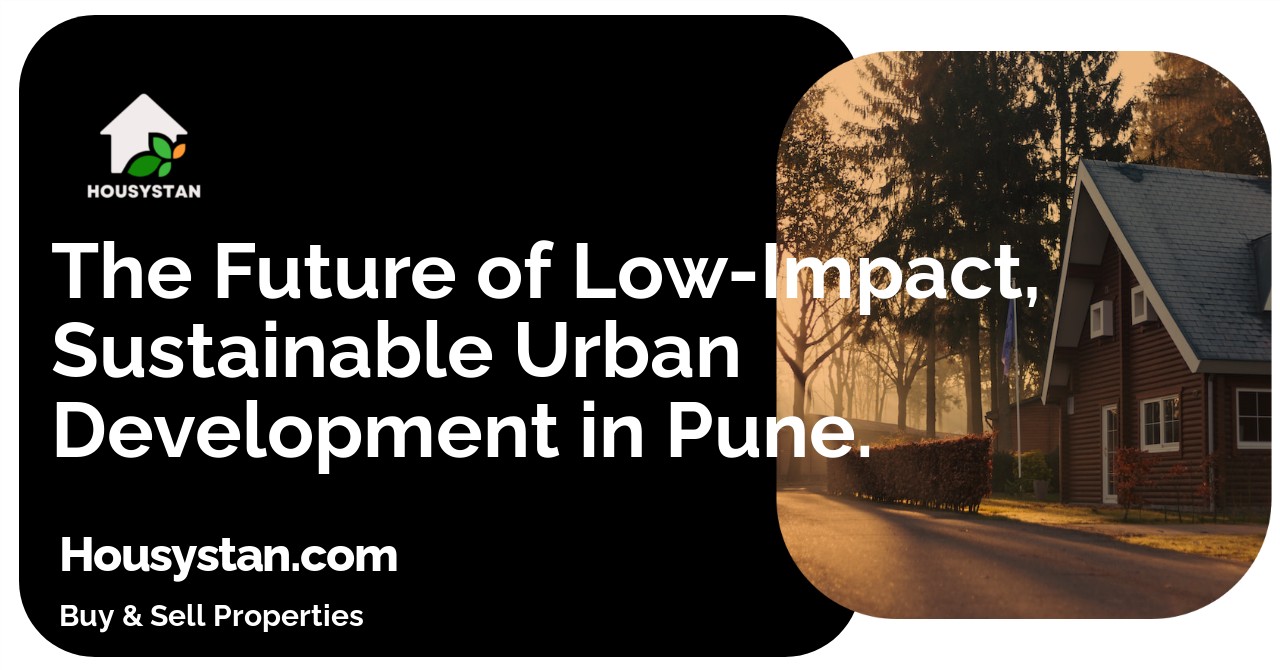The Future of Low-Impact, Sustainable Urban Development in Pune
Read latest blogs and articles from Housystan

The Information mentioned here was last updated on:
15/2/2026Exploring the Future of Low-Impact, Sustainable Urban Development in Pune
Introduction to Sustainable Urban Development in Pune
As the bustling hub of culture and technology, Pune is witnessing rapid urbanization. However, with growth comes the pressing need for sustainable development that minimizes environmental impact. Sustainable urban development refers to creating infrastructure and communities that prioritize environmental protection, social equity, and economic viability. In Pune, this concept is gaining momentum as the city looks toward a future that balances growth with ecological sustainability.
- Verified Tenants/Buyers
- Unlimited Property Listing
- Zero subscription/charges fee
Understanding Low-Impact Development
Low-impact development (LID) involves designing cities and infrastructure to reduce environmental footprints. This approach focuses on:
- Water Management: Implementing systems that efficiently manage stormwater and reduce pollution.
- Energy Efficiency: Utilizing renewable energy sources and promoting energy-saving technologies.
- Green Spaces: Integrating parks, gardens, and natural areas within urban landscapes.
- Waste Reduction: Encouraging recycling and reducing waste generation from households and industries.
By adopting these strategies, Pune aims to create a model of development that not only supports economic growth but also preserves its natural resources.
Key Strategies for Sustainable Urban Development
Pune's approach to sustainable development involves several key strategies that ensure minimal impact on the environment while catering to the city's growth needs.
1. Promotion of Green Building Practices
The introduction of green building practices is crucial for a sustainable future. These practices include:
- Energy-Efficient Construction: Encouraging the use of sustainable materials and technologies to minimize energy consumption in buildings.
- Innovative Design: Incorporating passive solar design, effective insulation, and natural ventilation.
- Rainwater Harvesting: Designing buildings to capture and utilize rainwater, reducing dependency on municipal water supply.
2. Enhancing Public Transportation
A robust public transportation system is essential for sustainable urban development. Pune is making strides in this area by:
- Expanding Metro Rail: Developing a metro network for efficient, low-emission transit across the city.
- Bicycle-Friendly Infrastructure: Creating dedicated bicycle lanes and bike-sharing programs to promote cycling.
- Improving Bus Services: Implementing high-frequency, reliable bus services to reduce reliance on private vehicles.
3. Increasing Renewable Energy Use
Transitioning to renewable energy sources is vital for reducing Pune's carbon footprint. Efforts include:
- Solar Power Initiatives: Installing solar panels on public buildings and encouraging private adoption.
- Wind Energy Projects: Exploring the potential for wind energy development in suitable areas.
- Government Incentives: Offering tax breaks and subsidies to promote renewable energy investments.
4. Innovative Waste Management Systems
Effective waste management reduces environmental impact and creates cleaner urban spaces. Pune's strategies include:
- Segregated Waste Collection: Implementing door-to-door waste segregation for effective recycling and composting.
- Waste-to-Energy Plants: Converting organic waste into bioenergy to power local grids.
- Community Awareness Programs: Educating citizens on the importance of waste reduction and proper disposal.
Smart Technologies in Urban Development
Integrating smart technologies is revolutionizing the way cities like Pune approach urban development. These technologies enhance efficiency and sustainability by:
1. Smart Grids and Metering
- Real-Time Monitoring: Implementing smart grids allows for real-time energy usage monitoring and efficient distribution.
- Demand Response Programs: Using smart meters to manage energy demand and reduce peak loads.
2. Intelligent Traffic Management
- Adaptive Traffic Signals: Using sensors to adjust signal timings based on traffic flow, reducing congestion.
- Traffic Data Analysis: Collecting and analyzing traffic data to improve road planning and infrastructure development.
3. Internet of Things (IoT) Solutions
- Environmental Monitoring: Deploying sensors to monitor air quality, noise levels, and water quality.
- Smart Lighting: Implementing LED streetlights with motion sensors to save energy.
Community Involvement in Sustainable Development
Sustainable development is a collaborative effort that requires active community participation. Pune is fostering this by:
1. Encouraging Citizen-Led Initiatives
- Neighborhood Clean-Up Campaigns: Organizing community events for local clean-ups and environmental conservation.
- Tree Plantation Drives: Engaging citizens in planting trees to enhance urban greenery.
2. Public Workshops and Training
- Sustainability Workshops: Offering training on sustainable practices like composting and rainwater harvesting.
- Skill Development Programs: Teaching green construction techniques and renewable energy system installations.
3. Digital Platforms for Engagement
- Online Forums: Providing platforms for citizens to discuss sustainable ideas and share experiences.
- Mobile Apps: Developing apps to report environmental issues and track sustainability initiatives.
Challenges and Opportunities in Pune's Sustainable Development
Transitioning to low-impact urban development presents both challenges and opportunities for Pune.
Challenges
- Infrastructure Costs: Initial investment in sustainable infrastructure can be high.
- Policy Implementation: Ensuring effective enforcement of sustainability policies can be complex.
- Public Awareness: Increasing public knowledge and acceptance of sustainable practices requires ongoing effort.
Opportunities
- Economic Growth: Green infrastructure can create jobs and stimulate economic activities.
- Resilient Communities: Sustainable development leads to communities that are better prepared for environmental challenges.
- Improved Quality of Life: Cleaner air, reduced traffic congestion, and green spaces enhance urban living.
Conclusion
Pune's journey towards low-impact, sustainable urban development is a testament to its commitment to preserving the environment while fostering growth. By implementing innovative strategies, leveraging smart technologies, and involving the community, Pune is setting an example for other cities in India and beyond. As the city evolves, the emphasis remains on integrating sustainable practices to ensure a harmonious balance between development and nature. With continued efforts, Pune is poised to become a beacon of sustainable urban living.
[Explore more about sustainable practices in Pune and how you can get involved in city planning and development initiatives here.]